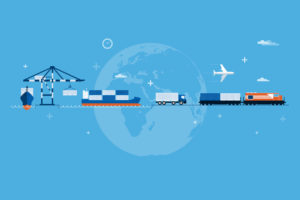The coronavirus pandemic has focused considerable attention on the supply chain for medical machinery, pharmaceuticals, and personal protective equipment like hospital gowns, masks, and gloves. Most Americans previously had little notion of how dependent the U.S. economy was on China and other overseas suppliers for items that are so indispensable to essential health care. They are just beginning to see the tip of the iceberg.
Our modern health care system, the best in the world, has built a global supply chain, which runs on outsourcing from the cheapest sources, based on the importance of keeping costs down. That means it also runs on very thin margins, and the coronavirus has shattered our previous illusions of stability and dependability. All it took was a global spike in demand, and the American economy found itself waiting in line.
 There is a much larger iceberg floating just beneath the surface, though, because these supply chain issues are not limited to the health care system. In fact, the U.S. economy has grown overwhelmingly dependent in China and a few other countries for almost everything Americans buy and use. Some economists now speculate about a society trying to operate without computers, cell phones, televisions, cars, trucks, airplanes, trains, fresh produce, books, power tools, building materials, solar panels, wind generators, toys, and shoes. All of these, and thousands of other products, are at least partly dependent on components made in China and elsewhere.
There is a much larger iceberg floating just beneath the surface, though, because these supply chain issues are not limited to the health care system. In fact, the U.S. economy has grown overwhelmingly dependent in China and a few other countries for almost everything Americans buy and use. Some economists now speculate about a society trying to operate without computers, cell phones, televisions, cars, trucks, airplanes, trains, fresh produce, books, power tools, building materials, solar panels, wind generators, toys, and shoes. All of these, and thousands of other products, are at least partly dependent on components made in China and elsewhere.
Most of us have supported recycling programs for most of our lives, and millions of Americans routinely sort their trash into two bins. We feel good about the growing percentage of trash that is now recycled (35 percent nationwide, though sadly only 12 percent in Colorado). Yet we continually see news about islands of trash in the Pacific, Vietnamese sick from working in unsanitary recycling plants, Malaysian beaches completely clogged with plastic trash, and plastic mountains in Turkish landfills – and in American landfills. Why isn’t this material simply recycled in the cities where it is used?
By the way, there is nothing inherently wrong with landfills, a perfectly efficient way to dispose, decompose, and eliminate waste. The problem is what we put there. We should not put non-biodegradable items in landfills, especially glass and plastic. According to the EPA, though, they represent only 17.3 percent of America’s “municipal solid waste,” the rest being food, paper, wood, metal, yard trimmings, leather, and textiles – all of which are biodegradable in landfills. So we send the glass and plastic to recyclers – or we think we do.
In fact, many American cities have actually scaled back on recycling recently, especially glass, which some have discontinued altogether. The reason given to consumers is that there just isn’t any market for the recycled glass. Well, that can’t be right. We know the market for both glass and plastic is skyrocketing worldwide – just not at the high cost of recycled material. That is all about shipping, which brings us directly back to the supply chain issue.
You see, millions of tons of recyclable material is shipped overseas every year because that’s where the recycling plants are. Jerry Powell, executive editor of Resource Recycling, says “Easily 80 percent of America’s mixed plastics are getting sent abroad.” That changes the economics, to the disadvantage of recycling. A Hong Kong broker explained to Atlantic Monthly that he pays $150 a ton for scrap plastic from the U.S. He pays to ship it to Asia, sells it to a processor who turns it into raw pellets, then he pays to ship it back to the U.S., where it now sells for over $800 a ton. Virgin (new) plastic sells for barely more than that, and its quality is considerably higher. Without the shipping costs to Asia and back, the economics of recycling would be completely different.
In other words, America does not have an environmental problem with plastic and glass – it has a manufacturing problem. Policy decisions over the past few decades drove manufacturing overseas. Reversing that, as most political leaders now advocate, requires changing those regulations, taxes, labor costs, and other factors that drove it away, and providing incentives to return such investments to the U.S.
This may not be exactly what Aretha Franklin meant in singing about the “Chain of Fools.” But her lyrics could apply to China, especially “You got me where you want me, and you treated me mean.” It is time for America to break that chain and bring critical suppliers back home. A prosperous future depends on it.
This column first appeared in the Grand Junction Daily Sentinel April 3, 2020.




Comments on this entry are closed.